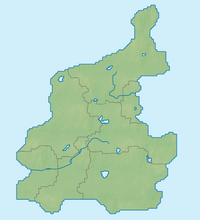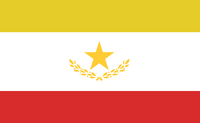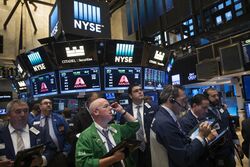Littland
The Federal Republic of Littland Forbundsrepublikken Littland | |
|---|---|
|
Flag | |
| Motto: Frihed over alt Freedom above all | |
| Anthem: Barn af Littland Child of Littland | |
 Map of Littland | |
| Capital and largest city | Kaslund |
| Official languages | Littish |
| Ethnic groups | 90% Litts |
| Demonym(s) | Littish - Litt |
| Government | Federal parliamentary republic |
• Federal President | Frederik Liebe |
• Prime Minister | Albert Simonsen |
• Speaker of the Folkekammer | Inger Knudsen |
| Landskammer | |
| Folkekammer | |
| Area | |
• Total | 383,872 km2 (148,214 sq mi) |
| Population | |
• 2022 estimate | |
• 2020 census | 16,814,000 |
• Density | 43.8/km2 (113.4/sq mi) |
| GDP (PPP) | 2021 estimate |
• Total | $1.051 trillion |
• Per capita | $62,530 |
| GDP (nominal) | 2021 estimate |
• Total | $869.166 billion |
• Per capita | $51,693 |
| Gini | medium |
| HDI | very high |
| Currency | Penning |
| Driving side | right |
| Calling code | +08 |
| Internet TLD | .li |
Littland, officially the Federal Republic of Littland, is an island completely surrounded by water located in the northern seas of Land's End. The country is structured of seven federated states, one of which is Kaslund, the nations capital and largest city. Littland island has an area of 383,872 km2 (148,214 sq mi) and has a population of nearly 17 million. While Littish is the country's official language, many Litts speak the English language.
Littland is a federal parliamentary republic with a Federal President as head of state and a Prime Minister as head of the federal government. The major cities of Littland include Kaslund, Klintrup, Lundum and Frankerup. As a developed country, with a high GDP per capita and a high Human Development Index rank, Littland offers social security and a universal health care system, environmental protection, and tuition-free university education. Littland has what is called a social market economy.
Geography
Littland is an island completely surrounded by water. Littland has an oceanic climate featuring genrally mild summers and cool but not cold winters. Littland experiences reliable and constant precipitation throughout the entire year. Despite this, thunderstorms are quite rare since hot and cold air masses meet infrequently in the region. The highest natural point in Littland is Rifbjerg at 176 metres above sea level.
Politics
Littland is a federal parliamentary republic. Federal legislative power is vested in the parliament consisting of the Folkekammer (lit. People Chamber) and Landskammer (lit. Lands Chamber), which together form the legislative body. The 183 seat Folkekammer is elected through closed list proportional representation of political parties, with a 2% electoral threshold. The Landskammer consists of 42 seats and is less powerful. Its members are selected by the state legislatures. The power of the Landskammer is rather limited, in most cases it only has veto-power over legislation. The judicial branch is headed by the Constitutional Court, which oversees the constitutionality of laws.
The Head of State in Littland is the Federal President. The Prime Minister runs the government and day-to-day politics while the role of the Federal President is mostly ceremonial. The Prime Minister heads the federal cabinet and thus the executive branch of the federal government. They are elected by and responsible to the Folkekammer. The current Prime Minister is Albert Simonsen.
States
Littland is a federal state and comprises 7 constituent states. Each state (Delstat) has its own constitution and is largely autonomous, some topics however, such as foreign affairs and defence, are the responsibility of the federal government. The states have some legislative authority like in matters of culture, social welfare and nature protection.
Economy
Littland has a high-income social market economy with a highly skilled labour force and a high level of innovation, with a nominal GDP of $869.166 billion and a GDP PPP of $1.051 trillion. Littland has a conservative influenced welfare state, where contribution to the economy and active participation in the workforce allows for greater social security. The weakest members of society do have access to services that would be considered to be from a universal welfare model. The Littish service sector contributes approximately 80% of the total GDP, industry 18%, and agriculture 2% as of 2020. The unemployment rate is approx. 4.1%. The Littish currency, the Penning, is valued at approximately 4.71 penning per USD. (Nominal GDP being 4.093 trillion penning) The growth rate in 2018 was set at 2.4%.
The Littish stock market index is operated by Kaslund Stock Exchange. Kaslund is also a hub for startup companies and Littland is recognised for its large portion of small and medium enterprises. In 2020 the largest companies by revenue in Littland were: the retail giant Guldbrand Group, pharmaceutical company Parsol, electronics manufacturer LittElec and the largest Littish bank Littland Banking. Additionally, Guldbrand Group is the largest private employer in the country with 81,645 employees in 2021.
Littland has a strong labour movement. The Littish Workers' Association (LAF) comprises constituent unions with a total membership of about 5.1 million. The LAF has pursued consensus-oriented wage policy, cooperating with industry, agriculture, and the government on social and economic issues.
Demographics
Largest cities in Littland
2020 Census | |||||||||
|---|---|---|---|---|---|---|---|---|---|
| Rank | State | Pop. | Rank | State | Pop. | ||||
 Kaslund  Klintrup |
1 | Kaslund | Kaslund | 3,289,000 | 11 | Lyndby | Varborg | TBD |  Lundum  Frankerup |
| 2 | Klintrup | Guldstrup | TBD | 12 | Brofelde | Sønderland | TBD | ||
| 3 | Lundum | Varborg | TBD | 13 | Aadal | Tystrup | TBD | ||
| 4 | Frankerup | Sønderland | TBD | 14 | Klarskov | Varborg | TBD | ||
| 5 | Lerte | Solbjerg | TBD | 15 | Vielsted | Solbjerg | TBD | ||
| 6 | Halling | Varborg | TBD | 16 | Gundslev | Guldstrup | TBD | ||
| 7 | Aalhavn | Tystrup | TBD | 17 | Skinnerup | Varborg | TBD | ||
| 8 | Gistrup | Sønderland | TBD | 18 | Fangel | Guldstrup | TBD | ||
| 9 | Rødskov | Rødholm | TBD | 19 | Alestrup | Tystrup | TBD | ||
| 10 | Tirslund | Solbjerg | TBD | 20 | Kalvslunde | Rødholm | TBD | ||
Education
| Kindergarten (Optional) | |
| Age | Grade |
|---|---|
| 3–6 | Børnehave Klasse |
| Grundskole Indskoling (Primary School) | |
| Age | Grade |
| 6–7 | Første Klasse |
| 7–8 | Anden Klasse |
| 8–9 | Tredje Klasse |
| 9–10 | Fjerde Klasse |
| 10–11 | Femte Klasse |
| Grundskole Udskoling (Middle school) | |
| Age | Grade |
| 11–12 | Sjette Klasse |
| 12–13 | Syvende Klasse |
| 13–14 | Ottende Klasse |
| 14–15 | Niende Klasse |
| 15–16 | Tiende Klasse |
Responsibility for educational supervision in Germany is primarily organized within the individual states. Optional kindergarten education is provided for all children between three and six years old, after which school attendance is compulsory for at least ten years. Secondary schooling is divided into tracks based on whether students pursue academic or vocational education. The government records upper secondary school completion rates of 96% and tertiary enrollment and completion rates of 62%. All university and college (tertiary) education is free of charges; there are no tuition fees to enroll in courses.

